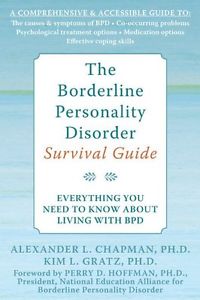 |  | Borderline Personality Disorder Survival Guide
Author: Alex Chapman, PhD, Kim Gratz PhD, and Perry D. Hoffman, PhD
Publisher: New Harbinger, 1st edition (November 15, 2007)
Paperback: 200 pages
ISBN-10: 1572245077
ISBN-13: 978-1572245075


|
Book DescriptionThe book is organized as a series of answers to questions common to BPD sufferers:
What is BPD? How long does it last? What other problems co-occur with BPD? Overviews what we currently know about BPD make up the first section of the book. Later chapters cover several common treatment approaches to BPD: dialectical behavior therapy (DBT), mentalization-based therapy (MBT), and medical treatment using psychoactive drugs. In the last sections of the book, readers learn a range of day-to-day coping skills that can help moderate the symptoms of BPD.
About the AuthorsAlex Chapman, Ph.D., is assistant professor in the Department of Psychology at Simon Fraser University. In July 2005, he completed a two-year post-doctoral fellowship with Marsha Linehan at the University of Washington, where he received training and supervision in dialectical behavior therapy (DBT) and in clinical research on DBT. Chapman received his Ph.D. in clinical psychology from Idaho State University. He completed his internship training focused on DBT and other evidence-based cognitive-behavioral treatments at Duke University Medical Center. Chapman has published several journal articles and book chapters and has given numerous professional presentations on borderline personality disorder (BPD), suicidal and self-harm behavior, DBT, and impulsive behavior, among other topics. Currently, his research focuses on understanding impulsive behavior and emotion dysregulation in BPD, with the ultimate aim of refining, developing, and understanding the mechanisms underlying efficacious treatments. He has had six years of experience and extensive training in DBT. As a DBT Trainer for Behavioral Tech, LLC, Chapman routinely gives workshops on DBT in both Canada and the United States. He teaches courses on DBT, supervises students in their treatment of BPD clients, and is a trained expert in coding adherence to DBT. In addition, Chapman has a small private practice in the Vancouver, BC, area, where he primarily sees clients with BPD.
Kim L. Gratz, Ph.D., is research assistant professor and director of the Personality Disorders Division of the Center for Addictions, Personality, and Emotion Research (CAPER) in the Department of Psychology at the University of Maryland. She received her Ph.D. in clinical psychology from the University of Massachusetts, Boston, in 2003, after completing a clinical internship at McLean Hospital/Harvard Medical School. Gratz has written numerous journal articles and book chapters on BPD, deliberate self-harm, and emotion regulation (among other topics). In 2003, she was awarded the Psychosocial Fellowship from McLean Hospital/Harvard Medical School to conduct a study examining the efficacy of a new emotion regulation group treatment for self-harm among women with BPD, and in 2005, she was awarded the Young Investigator's Award of the National Education Alliance for Borderline Personality Disorder (NEA-BPD).





 Poll
Poll
